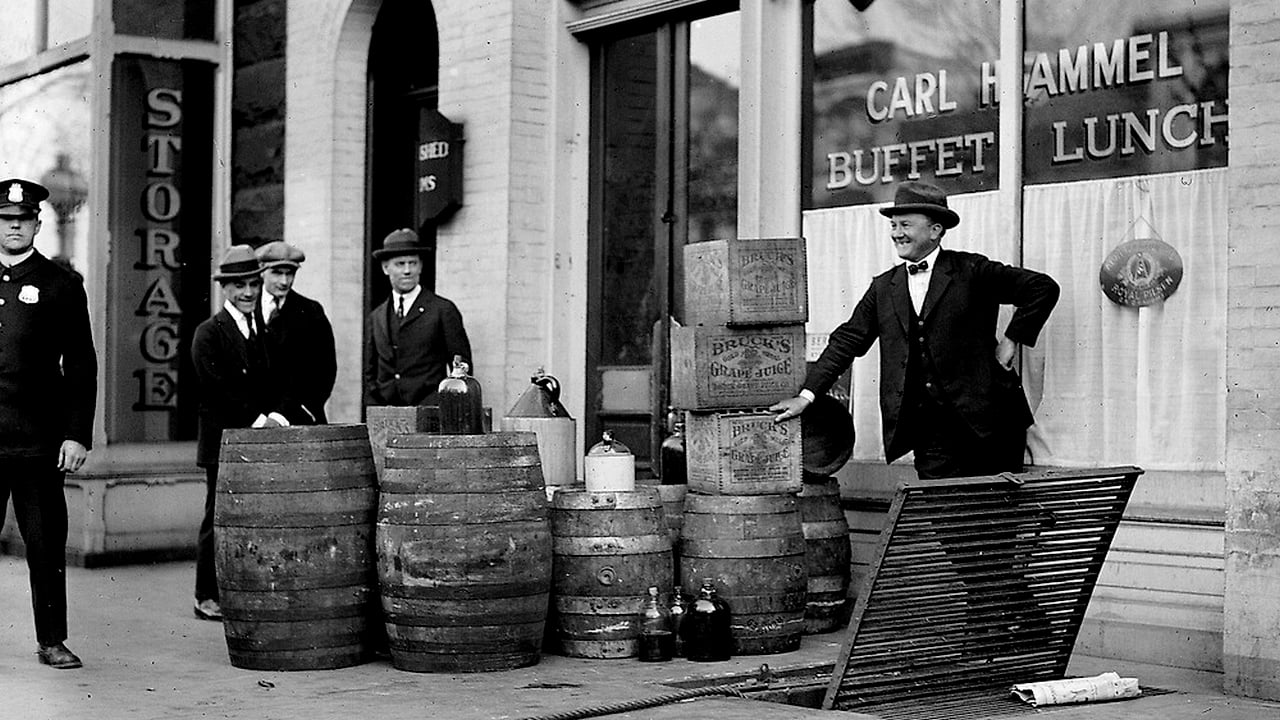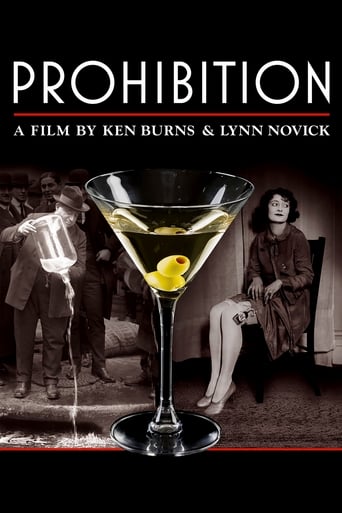Spoonixel
Amateur movie with Big budget
Organnall
Too much about the plot just didn't add up, the writing was bad, some of the scenes were cringey and awkward,
FrogGlace
In other words,this film is a surreal ride.
Monkeywess
This is an astonishing documentary that will wring your heart while it bends your mind
KidNorway
Prohibition took place in the early 1900's, was unpopular, and was repealed. That was the extent of my knowledge on prohibition. Ken Burns proved that such a big part of our country's history is worth taking a closer look at.The storytelling is excellent, with interviews of and narration by folks you'll likely recognize. The archival footage is eye-opening and heartbreaking. The comic relief is perfectly timed, and the facts presented here linger on the mind long after the TV is off.Personal preference will dictate whether the film's length outlasts its charm. I usually like things short and sweet, but I couldn't hold myself to a single episode in one sitting. However, at 5 hours it'll probably wear down the patience of some viewers.The only other downside I can think of is that some points are overly expounded upon, while other enticing tidbits will be mentioned briefly but not fully exemplified. I almost doubled the length of one episode by continuously pausing and googling something for more clarification.Of course, that could've been Ken's plan all along.
Joe Kucharski (joker-4)
Daniel Okrent's "Last Call: The Rise and Fall of Prohibition" and Ken Burns and Lynn Novick's "Prohibition" mini-series were two similar projects that began together resulting in two different end products. Together, both provide a rather detailed account not only of Prohibition's place in American history, but the events leading up to such, the results of repeal and the long-lasting societal impact of the entire matter. Separate, both are still strong, informative and entertaining yet each tend to focus on different themes that sometimes do not intermingle and the result is noticeable.Ken Burns, in his trademarked fashion, intermingles fantastically- original photos and video with colorful interviews from subject-matter experts and first-hand histories over-laced with celebrity voice-overs, makes learning hip and brings about a passion for a dark, but necessary, time in American history. Burns' documentary was too light in certain instances where a deeper look at American history would have benefited the story. Okrent's novel definitely fills in such details that Burns either ignored or edited out but was definitely too heavy at times with whole sections coming across as a historical text book rather than an entertaining narrative.Burns, and Okrent as well, enlighten 21st-Century audiences to the fact that Prohibition, what can be now considered a silly arrangement, was not only responsible for the rise of Jazz, the introduction of mixed drinks and the invention of speed boats but also led to very beginnings of the Civil Rights Movement and the outright success of Women's Suffrage. Naturally, Burns provides much attention to that of the gangsters of the era, particularly Chicago's Al Capone. But again, he provides just enough details for a satisfactory display of information yet fails to get deeper. Similarly, this occurs when discussing the role of the Church and the Prohibition movement. Dry Congressmen and Senators knew how to convince their Baptist and Methodist ministers to use the pulpit to condemn the evils of alcohol, particularly in the Mid-West states. Likewise, Prohibition was an outcry not just against alcohol but also against the rise of poor immigrants filling America's urban centers. The Irish, the Germans, the Italians, all known for enjoying wine and spirits, and all Catholics, became a scary threat for "decent, Protestant country folks". Cutting off immigrants from their alcohol was a way to ensure that these new Americans were productive members of society, not a burden of filthy drunkards. Burns did not spend too much time on these ideals. However, Burns attention to detail and crafting of a narrative tale is shown in his vision and with what is presented. He does keep entertainment at the forefront of his documentary, much like what he has done in the past, especially with his must-see Baseball series. Some indirect humor is presented with history playing the comedian to a more naïve time. Burns does get political with some of his views, but at no time are such views sobering enough to prevent the viewer from seeking out a drink.
ChetXBuck
I've always wondered how the US ever passed laws prohibiting alcohol. Such an amazingly common thing today, it would be like banning caffeine or soda. This six hour story is told well from all sides and it provides clarity as to the insane and radical motives behind the Volstead Act and how it backfired in every way. While the video and photos are all rather dated being from the 1910s and 1920s, the interviews of experts, historians and people with real-life stories really come together well. The narration is also great and uses some of the best names in the film business.This is a long series, about 6 hours. Ken Burns' direction is poignant and well-paced. It gives you time to think about the meaning and the historical impact of each chapter of this story which touches on many decades.I feel I know understand an important part of American history that never made sense to me. Concepts like "Bootleggers and Baptists" being aligned and the role of the gangsters in society become crystal clear after viewing this film. I had no idea how vicious and immoral the attacks on Al Smith were by the Herbert Hoover camp. Politics and police seem violently corrupt in this era. You learn a lot about life, laws, religion and politics in a difficult and bitter era (the Great Depression). Most importantly, you are reminded of the fact that US was built on Freedoms--and Prohibition is such an amazing violation of this. It's a historical guidepost to preserving our freedoms going forward.The story of the Roaring 20s, flappers, the speakeasy, the rum-runners, and ironically, how the post-prohibition era was favorable to women and equality and stories I'd never imagined.FDR had three priorities when he took office: 1) regulate the banks, 2) cut federal spending, 3) legalize beer. He won by a landslide. On a funny note, Utah voted to repeal the Volstead Act rather quickly. Amazing given that that state has spend the last 80 years trying to restrict it! This three DVD series is worthy of a weekend of your time. Thanks PBS for this fine historical film and Ken Burns for another amazing tale.
verbusen
You know, it's OBVIOUS, that this was done by PBS. Within the first 5 minutes the term spousal RAPE is used! Hey I came here to learn about prohibition, sheesh! All the people contributing in the first episode are all liberals. I mean can we get some freaking balance in this stuff with PBS? They hurt themselves by being so liberal. Cases in point. They talk about all the political sides who supported temperance but they never use the word "liberal" and never use the word "communist" I mean you know what part I am talking about when they say "progressive" and "radical".Also, the old drunk looking dude makes the sly comment that now Jesus would be put in jail for turning water into wine. Hey smart guy, Jesus did not SELL the wine. Why did they have to go there? Looking at the credits while typing this John Lithgow, Tom Hanks, Sam Waterston, this program is loaded with liberals, are there any non liberal contributors in this? Look up Noah Feldman's wiki page, he is in most of this episode as a commentator expert, that guy is a poster child leading elitist liberal.For full disclosure, I am a drinker, non evangelical, and I happen to live in a Muslim country thats dry and break it's laws in much hazard to myself because I want a drink. I'm only putting this review out here to raise the case that PBS is not the unbiased network it has always said it is. It would serve it's own purposes better if it was truly open minded. Stop with the NPR "all things considered" treatment, talking down to us, you wont convince us that you are correct anymore. Interesting material, definitely done to entertain a liberal viewership which I guess is all PBS has left, it's a shame that all things were NOT considered. 6 of 10, I learned that the bible thumpers got us an income tax in an alliance with "progressives".I have about zero trust that this series will cover all bases or just focus on the lower class's drinks like beer. Lets see where they go with wine and hard liquor which the rich enjoy now. They mention Kennedy's (JFK) grandfather but lets see them mention his father Joe Sr, frankly I cannot see how they could NOT mention him, but it IS PBS so anything is possible when liberals write their own history.

